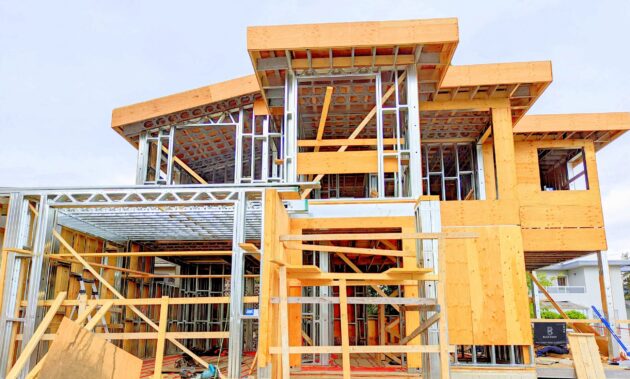
Canadian Manufacturing Q&A: Build Smartr CEO Harv Sidhu
by Sadi Muktadir

The fledgling company is trying to make waves in sustainable construction through transitioning away from the heavy environmental cost of lumber frames, to longer-lasting, and cheaper steel ones.

One of Build Smartr’s steel frames on display at a construction site in North Vancouver, B.C. (Credit: buildsmartr.com)
Build Smartr is a Canadian manufacturer of steel frames for the home and residential construction industry. Started by Harv Sidhu and based out of B.C., the fledgling company is trying to make waves in sustainable construction through transitioning away from the heavy environmental cost of lumber frames, to longer-lasting, and cheaper steel ones.
Canadian Manufacturing sat down with CEO Harv Sidhu to ask about the company’s challenges, goals, journey and how manufacturing is changing from a construction perspective.
CM: Can you tell us about how Build Smartr came together and why it’s in the sustainable manufacturing space?
Harv: For sure. I graduated from SFU, and I entered the family business of construction. While building homes all across the greater Vancouver area, I found a fundamental problem of obsolescence. I was noticing that after 30-40 years, the homes were breaking down or having problems due to the lumber frames used in construction. The question I was asking was ‘how can we make homes faster and cheaper?’
CM: Where is your steel manufactured and can you give a breakdown into how ‘Canadian’ your operations are?
Harv: We’re definitely a Canadian manufacturer. We source our steel from all over, from a wholesaler who purchases it in Asia, China, Turkey, and sometimes Eastern Canada, but it’s all manufactured and put together in our B.C. warehouse.
CM: You were recently named to the Cleantech Foresight 50, as a promising sustainable venture for using recycled steel in your operations. Why recycled steel?
Harv: We know that one-third of all landfill waste is from construction sites, and we can try to create a more circular economy by using some of the steel from these construction sites in our Prefabricated homes. It’s cheaper, more durable, and better for the environment. There’s a fundamental problem of homes breaking down after many years, and landfill waste going un-recycled as well. We think we can make money solving that problem so why not?
CM: What’s different about your steel frames compared to others in the market right now in Canada?
Harv: Right now, there aren’t many players in the prefabrication market. Steel’s obvious advantage is that it’s stronger, it will last longer and it’s not combustible. With the increased number of forest fires in recent years on the West coast especially, the steel frame construction is even better.
CM: It sounds like steel has so many advantages compared to lumber frames in construction so we’re wondering why other companies haven’t caught onto this?
Harv: There’s a problem of scaling steel for larger construction projects. The construction industry in Canada is set up to support lumber and its infrastructure, it’s very easy to place large orders of lumber and have them fulfilled, which is not the case for steel. Suppliers, the inspection industry and the trades are all set up to use wood frames in construction, making it harder as well.
CM: What’s the focus for Build Smartr in 2024, how do you grow from here?
Harv: We’re focused on increasing our capacity and production. We’re making investments and looking for a larger space to work out of. We’re still looking for more clients and expanding outside of B.C. We already have some exciting orders and opportunities to work on some projects in Ontario, so we’re looking forward to building on that.